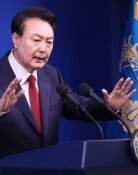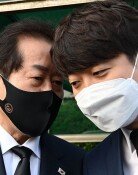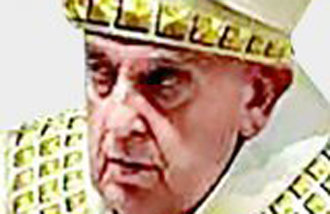Prosecutors Reject Arrest Warrant for Jeong
Prosecutors Reject Arrest Warrant for Jeong
Posted September. 22, 2007 08:45,
Prosecutors criticized the court of dismissal for the request to issue an arrest warrant for former protocol secretary Jeong Yun-jae, questioning its warrant-issuing criteria and principles of equity. Senior prosecutor at the at the Busan District Prosecutors Office Jeong Dong-min said in a press conference yesterday in regard to the courts decision, Getting the arrest warrant is not an absolute must.
Criteria and Equity
We compared cases of Mr. Heo, the 6th highest public official, and Jeong Sang-gohn, former director of the Busan National Tax Service (bribery charges), and Jeong Yun-jae (charges of influence peddling for illegal personal gain) to see how the court handled the issuing of arrest warrants.
The prosecution applied for a warrant with the court in January 2005 against Heo, who received 25 million KRW from Kim in bribes in exchange for providing favorable treatment during a tax investigation. Kim confessed to the crime and the court issued an arrest warrant against him.
An arrest warrant against Jeong was requested on August 26, 2006 for receiving 100 million KRW in exchange for delaying a tax investigation. Jeong and Kim both pleaded guilty. Jeong gave up being reviewed under the Substantial Examination System of Warrants, and the court, after reviewing the investigation records, issued the arrest warrant. The court dismissed the arrest warrant request by the prosecution against the former protocol secretary for taking 20 million KRW from Kim in return for arranging a lobbying campaign to end a tax investigation. The court did not issue the warrant as it saw that Jeong would not destroy evidence, even though it agreed with the prosecution that Jeong had committed a crime.
One court official said in regard to not issuing an arrest warrant against Jeong, Charges of former Busan tax chief Jeong and the former protocol secretary, if proved in court, will carry different weights, thus making a difference in sentencing.
However, judges and lawyers said, Since the former secretarys charges have been proved, the importance of the case should have been regarded as more important than the possibility of evidence destruction.
Controversy over Evidence Destruction
There is growing controversy over the courts judgment of former secretary Jeong not destroying evidence. The prosecution requested Jeong to be arrested, citing that he and Kim talked on the phone and texted under other names many times during the related investigation.
From August 9 to 27, when the former tax chief was arrested, they called each other about ten times. Before the arrest, prosecutors said they talked on the phone only once or twice a month. The first time this newspaper covered the news was on August 28. From August 27 to September 5, until Kim appeared voluntarily at the prosecutors office, the number of phone calls made between the two increased to 20.
Kim stated that Jeong called during the investigation and said, I only received 20 million won for the legal political sponsor fund. This became one of the reasons prosecutors decided to arrest him. However the court said that it does not think his remarks constitute a reason for destroying the evidence of the case. One senior prosecutor said, The public prosecutors and the court are considered one. If the general public loses faith in the warrant-handling criteria of the court, they will ignore both the court and prosecutors.
verso@donga.com surono@donga.com
Headline News
- Korean president faces debate limitations unlike U.S. counterpart
- KEPCO's first quarter profits failed to meet market expectations
- Teenagers are left out of discussions about national pension
- 2 consultative bodies submit minutes regarding increasing number of medical students
- Woo Sang-hyuk's rivalry and friendship transcend borders







